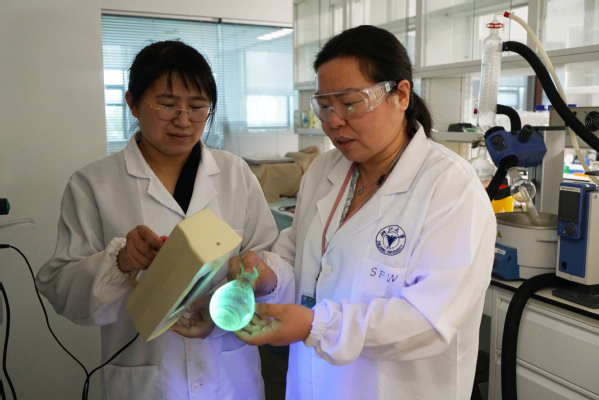Dialogue@ZJU: With Dr. SHAO Fangwei from the International Campus
【Message from the editor: Opening in 2015, the International Campus is now composed of two joint institutes, one international business school and one institute of China Studies, offering 7 undergraduate program, 14 master’s degree programs and 23 Ph.D. programs. Located in the city of Haining, between Shanghai and Hangzhou, the Campus is currently the home to 55 full-time faculty members. What attracts them to Haining and the International Campus? In Dialogue@ZJU, some faculty members will share their research and teaching there. In this issue, let’s meet Dr. SHAO Fangwei, Associate Professor at the Zhejiang University-University of Illinois at Urbana-Champaign Institute (the ZJU-UIUC Institute, ZJUI).】

I have been at the International Campus of Zhejiang University for more than two years. My experiences here have convinced me that my life dream is becoming true.
Coming to the International Campus
I was born in Shanghai. As a native Shanghainese, I went to the high school affiliated to Fudan University, which guaranteed me a top-level Chinese style of pre-college education. I then was admitted to Fudan University with entrance exam exempted. My systematic training in modern science started at this C9 university in China. From then an idea of going to the Western world emerged. I always wondered how the birthplace of those canonical equations and theories would look like and what the students at those universities in north America and Europe would study and ponder, how they would study, and where they would apply their knowledge.
After graduating from Fudan University with both BS and MS in Chemistry, I went abroad to study for a PhD at California Institute of Technology in Pasadena, USA. Later I joined Harvard Medical School for postdoctoral research. Upon the completion of training, I started my independent research and stayed as faculty member at Nanyang Technological University for eight years. For more than three decades, I have fully experienced education systems on both sides of the Pacific Ocean. A new idea emerged from my heart. “Is it possible to harvest the strengths of both Eastern and Western education and develop an even better teaching philosophy along with undergraduate research?” I knew for sure it would not be possible to explore the idea either in the United States or in Commonwealth countries. I would only have the chance to make this work if I taught in a university in China.
The chance was already approaching me even before I started to look for it seriously. In the summer of 2018, Prof. LI Er-ping, the then-dean of ZJUI, invited me to visit the International Campus of ZJU in Haining. During this visit, I was amazed by the education strategy of ZJUI as a collaborative style between ZJU and UIUC, which allows ZJUI to take advantage of both education systems to nurture a new generation of leaders in engineering. This is exactly what I have always dreamed of.
It is both a responsibility and a mission for me to come to my motherland to explore international collaboration in education. I deeply believe this innovative style of education will pave the way towards a bright future for the International Campus.
Actively engaged in the development of the International Campus
It happened to be surprisingly smooth to join IC. After just several months of communication, I officially landed in ZJUI as a foreign faculty member in March 2019. Quickly I noticed that interdisciplinary science has a unique “common status” on the Campus. Leading on from discussions and brainstorms on various occasions, my research started and readily blended into the IC environment.

My research group focuses on the science and engineering of nucleic acids chemistry and biomolecular nanotechnology. This field is closely connected to both engineering and medical practice, and fits perfectly into the cross-discipline of the two institutes on the IC. Once I established my laboratory in the ZJE building, collaborations with both faculty houses started instantly. Together with Prof. GUO Wei and Prof. HONG Zhi’s group, we are exploring DNA nanohydrogel as novel delivery nano-vessels for anticancer therapeutics. We also work with Prof. HU Huan to develop bio-mimic electric device on nanometer scale. We expect to have DNA nanostructures as novel technologies for the applications in healthcare and electric engineering.

The International Campus also applies the merits of Chinese and Western universities to the management and administration of the university. The work union on the IC formed the International Campus Faculty Congress (ICFC) to engage the faculties and supporting staff in the decision making of administration policy. To my surprise, I was elected to the Executive Committee of the ICFC even as a newcomer with merely one year’s service at the IC. This never happened to me in the past near twenty years of studying and teaching abroad. ZJUI also adopted the Western university faculty committee system and appointed me as the chairman of the undergraduate academic committee (UAC). I lead the UAC meeting to make opportunities for faculties to exchange ideas and updates on teaching on a regular basis. Both ICFC and faculty committee enhance the engagement of the faculties in the management of our International Campus. This trust and attention really touch my heart. Though it was the nice spring view and familiar hometown dialects that attracted me at first sight when I stepped on Haining’s land, it is the education management and research environment that make me feel I really belong here.
“The house is home” is deeply rooted in every Chinese mind. Recently my wish to make ZJU my home became true. I bought an apartment in Hainshire and will have the International Campus as both my residential and dream home. This makes me feel settled in Haining and devoted to the education and research development in my mother country, China.
For more stories about the faculty members at the International Campus, please click here.
Source: International Campus, Zhejiang University